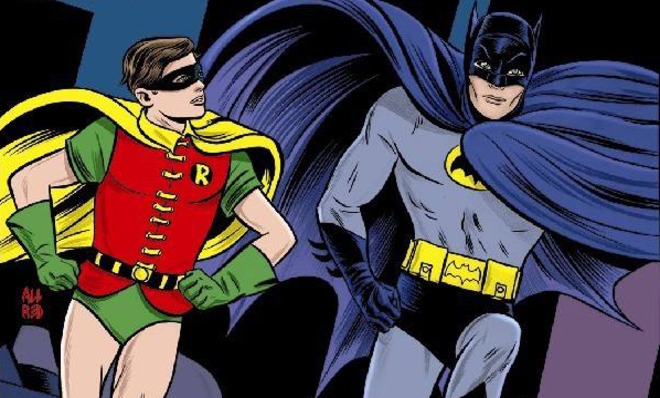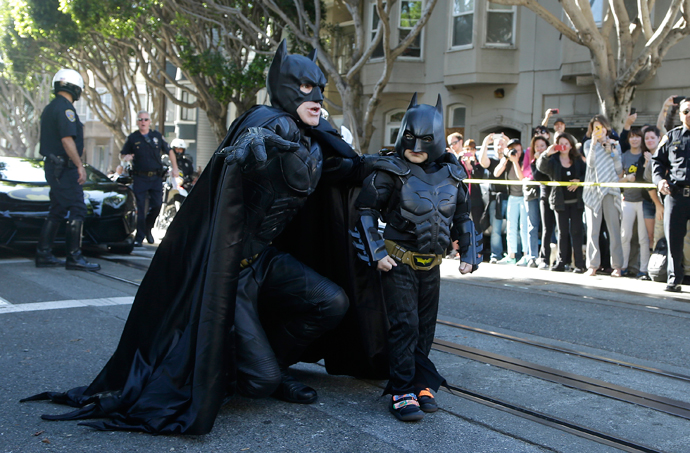Holy prefix, Batman! A look at Bat-words in honor of Batman's 75th anniversary
Batman's contributions to the English language are as varied and colorful as his rogues gallery

A free daily email with the biggest news stories of the day – and the best features from TheWeek.com
You are now subscribed
Your newsletter sign-up was successful
It's been 75 years since Batman made his comic book debut. Since 1939, the cowled hero has contributed villains, sidekicks, gadgets, and thousands of stories to popular culture — and no less significantly, quite a few additions to the English language.
Almost everyone can recite the names of the major Batman allies (Alfred, Commissioner Gordon, Robin) and villains (The Joker, The Riddler, The Penguin, Two-Face). Nicknames such as "the caped crusader," "the dark knight," "the world's greatest detective," and "the boy wonder" are thrown around in any number of contexts, as is the fill-in-the-blank phrase "Holy ___, Batman!" But among all these linguistic contributions, the most flexible and fun Batman-ism is probably the Bat- affix, which is seen in Batarangs, Batcows, Batkids, and beyond.
Though my interest in reading and watching Batman has ebbed and flowed, I've been a lifelong fan of Bat-words. Who wouldn't be? Bat-terms are invariably fun to say, and what kid doesn't dream of hanging around the Batcave, driving the Batmobile, or tossing a Batarang at a villain's head?
The Week
Escape your echo chamber. Get the facts behind the news, plus analysis from multiple perspectives.

Sign up for The Week's Free Newsletters
From our morning news briefing to a weekly Good News Newsletter, get the best of The Week delivered directly to your inbox.
From our morning news briefing to a weekly Good News Newsletter, get the best of The Week delivered directly to your inbox.
Many of those terms were coined by Lorenzo Semple, Jr., who created the Batman television show and died last week at age 91. Semple also wrote the Batman movie from that era, so he is presumably the coiner of Batcopter, Bat Ladder, and Super Fine Batgrain, all of which are used in the film. The movie also takes the Bat- prefix to the absolute extreme: During some antics at sea, the caped crusader fends off a shark with — what else? — Shark Repellant Bat-spray.
Robert Greenberger's The Essential Batman Encyclopedia, which surveys the comics since 1939, is a wonderful source of similar terms. Some refer to allies of Batman, like Batgirl and Batwoman, or lesser-known characters like Batboy, Bat-Hombre, and the Bat-Squad. There are many Bat-vehicles: Batboat, Batcycle, Batgyro, Batmarine, and Batplane. There is also the Whirly-Bat, a single-seat, helicopter-type vehicle whose name inverts the usual word-making formula. Batwing has been the name of a vehicle and, more recently, an ally of Batman's. There's even Batzarro, who's defined as the opposite of Batman: "the world's worst detective."
Though such words reek of DC's surreal and often silly Silver Age of the 1950s and '60s, Bat-terms keep popping up in the modern comics, which are generally far darker in tone. In a recent series called Batman Incorporated, Grant Morrison and Chris Burnham introduced Batcow: a genetically modified bovine with natural markings that look like a Batman mask. Batcow, who offers an occasional "moo" of comic relief throughout Morrison and Burnham's run, hearkens back to the wackier era of the '50s, when no Bat-teammate was too implausible, not even Ace the Bat-hound (a German Shepherd in a mask) or Bat-Mite (a trouble-making imp from the fifth dimension). Meanwhile, in JL8 — a kids' comic featuring Muppet Babies versions of the Justice League — lil' Bruce, after hearing that lil' Wonder Woman touched lil' Superman, offers Clark his "anti-cootie bat-idote."

The ubiquity of Bat-terms has made them contagious, and many have been coined beyond the world of comic books. When Ben Affleck was cast as the next Batman, fans were outraged, as only fans can be, uniting under one word: the supremely versatile Batfleck. Much like ObamaCare, Batfleck has been adopted by both supporters and critics. A far more heartwarming Bat-term features a similar construction: Batkid. That's the nickname given to the five-year-old cancer survivor who got to be Batman for a day, as the Make-A-Wish Foundation (with a lot of help) transformed San Francisco into Gotham.
A free daily email with the biggest news stories of the day – and the best features from TheWeek.com
There are also some terms that would make Batman proud — even though they predate him by decades or even centuries. The Oxford English Dictionary records words such as bat-flight, bat-light, bat-shell, bat-tick, bat box, and bat fly. We all know about the Batsignal that Commissioner Gordon shines to summon Batman, but a bat-light is simply darkness or gloom and has been since the 1800s. A bat box is just that: "an insulated box designed for bats to roost in." A bat fly isn't a version of the Whirly-Bat: it's a parasitical fly that preys on bats. One of the most delightful non-Batman bat-words comes from the mysterious, dubious world of cryptozoology: the batsquatch is a sasquatch-type creature with wings that bears a strong resemblance to Man-Bat, a Batman villain.
So what makes these terms so numerous? Why are they more common than words starting with, say, Super-, or Spider-, or Iron-? Part of it has to do with the cultural dominance of Batman and the huge cultural impact of Semple's Batman TV series. Though a more serious version of Batman has been ascendant since Frank Miller's The Dark Knight Returns in 1986, the giddy fun of the TV show is hard to forget: it was a pure expression of the fantasy of being Batman.
And that fantasy aspect of Batman has a lot to do with the appeal of Bat-words. None of us can be a zillionaire superhero with cool gadgets who gets to beat up clowns, and few of us will ever have a butler or a bromance with the police commissioner. But making up Bat-words is a game anyone can play — which, by extension, makes us feel a little more like Batman.
Mark Peters is a humorist and freelance writer who writes regularly for McSweeney's, Psychology Today, and Visual Thesaurus. He has also written for Salon and Slate.


